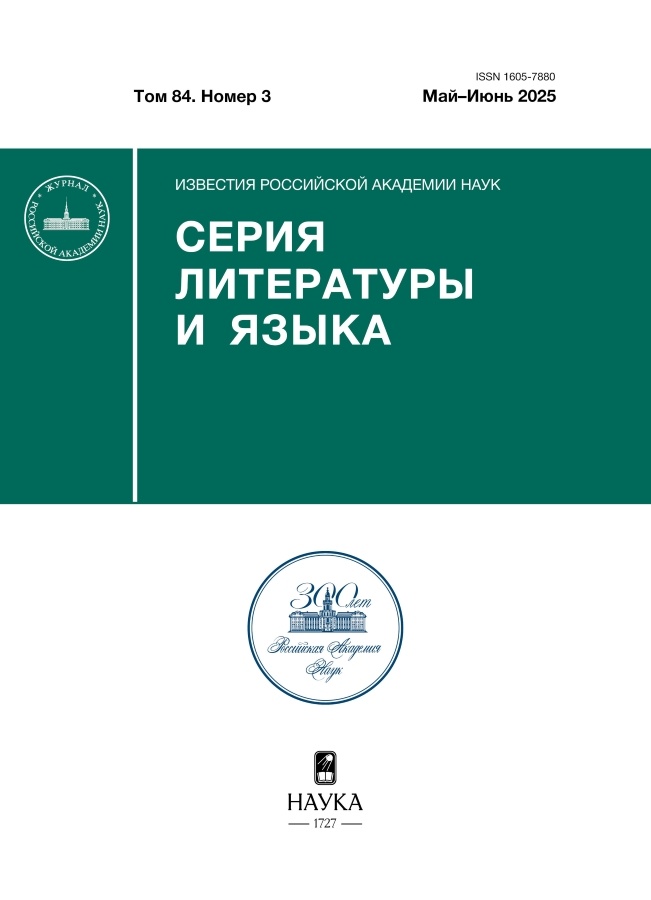From the Novel “Y” to the Novel “Crimson Sunset”: Vs. Ivanovʼs Work on Studying Factories in the 1930s
- 作者: Papkova E.A.1
-
隶属关系:
- A.M. Gorky Institute of World Literature of the Russian Academy of Sciences
- 期: 卷 84, 编号 3 (2025)
- 页面: 15-25
- 栏目: Articles
- URL: https://rjdentistry.com/1605-7880/article/view/691873
- DOI: https://doi.org/10.31857/S1605788025030025
- ID: 691873
如何引用文章
详细
Vsevolod Ivanovʼs novel “Y” (1932), which has been analyzed by researchers mainly from the perspective of its experimental form and satirical content, as well as its allusions to Russian and European literary works, is discussed in detail for the first time in this article in the historical and literary context of the 1930s. The connections of the novel itself and the editorial board that led to the creation of an independent work, “Crimson Sunset” (1934), are linked to the new general theme of proletarian literature that was formulated in 1931. This theme brought with it new requirements for writers, including the task of depicting the construction of factories during the first five-year plan and showing heroes of labor and new people and so-called “saboteurs” in industrial production. From the point of view of the challenges of the era and their fulfillment, the author of the article, utilizing new biographical sources, analyzes a group of texts: a fragment of the novel “Y”, published in periodicals; its complete text, which was not published during Ivanovʼs lifetime; the never-published novel “Crimson Sunset” (it is stored in the archive), and its original concept, as reflected in its publication in periodicals. The article traces how the absurdity and irony, including over industrial construction, of the novel “Y”, where Ivanov showed mainly “former” people, in the novel “Crimson Sunset” are replaced by an image in the foreground of a factory in Donbass. The writer visited real factories in 1933, and these served as the basis for the description in the novel. Moving away from the ironic tone of the original draft of the novel, Ivanov in “Crimson Sunset” shows representatives of working youth who strive to become new people with a new consciousness. He also introduces images of saboteurs who interfere with this process. It is concluded that, at the same time, the novel “Crimson Sunset” turned out not to correspond to the expectations of the ideologists of its time for literature. Reflecting on the fates of people during the era of socialist construction, and striving to capture the unpredictable real life and the “secret of secrets” of the human soul, the writer created a work that was in many ways an alternative to the Soviet literature of the 1930s. In this work, he explored the non-proletarian emotions of sacrifice, loneliness, and longing that were often ignored or suppressed in official Soviet literature.
作者简介
E. Papkova
A.M. Gorky Institute of World Literature of the Russian Academy of Sciences
Email: elena.iv@bk.ru
25a Povarskaya Str., Moscow, 121069, Russia
参考
- Гладковская Л.А. Жизнелюбивый талант. Л.: Художественная литература, 1988. 304 с.
- Черняк М.А. Романы Вс. Иванова «Кремль» и «У» в творческой эволюции писателя / Дис. … канд. филол. наук. СПб.: Рос. гос. пед. ун-т, 1994. 221 с.
- Якимова Л.П. Возвращенные романа Вс. Иванова «Кремль» и «У» как жанровая дилогия // Якимова Л.П. «При жизни произведен в классики». Всеволод Иванов в историко-литературном контексте 20-х – 30-х годов ХХ века. Новосибирск: СО РАН: Изд-во СО РАН, 2019. С. 177–192.
- Папкова Е.А. Роман Вс. Иванова «У» в общественно-политическом контексте 1930-х гг. // Эпоха «Великого перелома» в истории культуры: сборник научных статей / Под ред. И.Ю. Иванюшиной, Е.А. Тарасовой. Саратов: Изд-во Саратовского ун-та, 2015. С. 91–97.
- Обращение ЦК ВКП(б) ко всем партийным, хозяйственным, профсоюзным и комсомольским организациям. Свердловск; М.: Гос. изд-во, 1930. 16 с.
- Тимофеев Л. Встречный промфинплан пролетарской литературы // На литературном посту. 1931. № 1. С. 39–44.
- Макарьев И. Показ героев труда – генеральная тема пролетарской литературы // На литературном посту. 1931. № 31–32. С. 27–36.
- Перцов В. Личность и социалистическое дело (О романе Ф. Гладкова «Энергия») // Красная новь. 1933. № 4. С. 180–191.
- Большая цензура. Писатели и журналисты в Стране Советов. 1917–1956. Документы. М.: Международный фонд «Демократия», 2005. 750 с.
- Иванов Вс. Черпаковский на заводе // Красная нива. 1931. № 3. С. 3–6.
- Магуйар Р. Красная новь: советская литература в 1920-х гг. / Пер. с англ. М.А. Шерешевской. СПб.: Академический проект, 2004. 366 с.
- Иванов Вс. Кремль. У. Романы. М.: Советский писатель, 1990. 528 с.
- Процесс Промпартии и литература // На литературном посту. 1931. № 1. С. 45–46. Б.п.
补充文件









